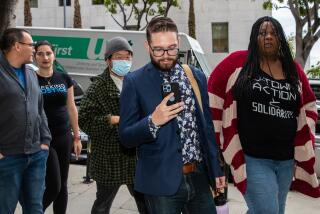Detainees in anarchist investigation released
SEATTLE â Two activists jailed for refusing to cooperate in a federal grand jury investigation of anarchists in the Pacific Northwest were released from prison Thursday after a judge ruled there was little chance they would change their minds.
The detainees, Matthew Duran and Katherine Olejnik, were freed from a detention center south of here where they had been held for more than five months, mostly in solitary confinement. Officials had hoped to pressure them to testify about suspected anarchists believed to have vandalized a federal appeals courthouse in Seattle during May Day demonstrations last year.
The pair have been the subject of public demonstrations and an appeal by the Seattle Human Rights Commission, which this month argued that holding them isolated for 23 hours a day with little human contact could cause permanent psychological injury.
âWeâre glad that theyâre out of prison. They shouldnât have been there in the first place,â said Kristian Williams, a spokesman for the Committee Against Political Repression. Williams represents one of dozens of groups that accused the Justice Department of targeting political movements in its investigation into anarchist-inspired property damage during recent anti-corporate demonstrations.
âNobody talks, everybody walks,â became the slogan in social media posts demanding an end to civil contempt incarcerations targeting direct-action protests.
On Wednesday, U.S. District Judge Richard A. Jones ordered the pairâs release, concluding that there was so little possibility they would agree to testify that holding them longer constituted not coercion but punishment.
âTheir resolve appears to increase as their confinement continues,â the judge wrote in his ruling. âWhatever the merits of their choices not to testify, their demeanor has never given the court reason to doubt their sincerity or the strength of their convictions.â
Duran, a computer technician and self-described anarchist from Olympia, Wash., and Olejnik, a community activist and bartender who also has connections in the anarchist community, argued that the grand jury was on a fishing expedition aimed at anti-government political beliefs.
âHis first concern was that the government was targeting him because of his associations and activities instead of any genuine evidence that they had,â said Duranâs attorney, Kimberly Gordon. âExamining his conscience and his morals suggested to him that he didnât want to be part of the governmentâs efforts to put other people in custody.â
An FBI affidavit in the case outlined extensive evidence that masked demonstrators attacked the doorway of the federal courthouse with long wooden sticks.
It appeared that many of them are already known by name to the authorities, who believe they traveled from Oregon and coordinated with Seattle activists by cellphone and text message, according to the affidavit.
Defense lawyers argued that Duran and Olejnik had served longer in custody than some of the purported targets of the grand jury criminal investigation would likely face if identified and convicted.
A small group of friends and attorneys waited most of the day outside the detention center for the pairâs release. A party was planned Thursday night at the establishment in Olympia where Olejnik works as a bartender.
âSheâs such an amazing, strong person, I know sheâs been making an effort not to allow the very cruel conditions affect her mental health,â said Olejnikâs attorney, Jennifer Kaplan.
Although the courtâs ruling dispenses with the civil contempt detention, federal prosecutors could still decide to file criminal contempt charges. Emily Langlie, spokeswoman for the U.S. attorneyâs office in Seattle, said federal authorities would have no comment. âThe law provides that it is up to the judge to determine whether detention for civil contempt continued to be coercive,â she said.
A third detainee, Matthew Pfeiffer, who was incarcerated in December, remains under detention in the case, but he has been taken out of isolation.
More to Read
Sign up for Essential California
The most important California stories and recommendations in your inbox every morning.
You may occasionally receive promotional content from the Los Angeles Times.










